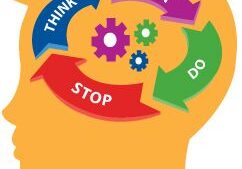Executive Functioning – Part 2
February 14, 2023

To briefly summarize, before getting into the nitty gritty, executive functioning comprises the skills of thinking (cognition) and doing (behavior). In an elementary classroom, examples of those skills are:
- A student finishes an assignment, places it in the “Finished Bin,” returns to their seat, and starts working on the next task. (working memory)
- A student hears the teacher call for “pack up,” so they pull out their HW agenda, write their HW down, place their agenda and all needed assignments in their backpack, then complete their classroom job. (organization)
- A student gets permission to use the restroom and returns back within 3-4 minutes, and gets back to the task at hand. (time management)
- A student recognizes they are stuck on a math problem, gets up, approaches the teacher, and articulates they need help. (metacognition)
- A student completes a graphic organizer in preparation for a writing assignment, then uses it to draft their piece of writing. (planning/prioritizing)
- A student experiences conflict with a classmate and realizes they are hurt and angry, so they use their words and express to the classmate how they feel and what they want them to do differently in the future. (emotional control)
- A student is reminded of something exciting they did the day before when another is sharing at Morning Meeting, so they wait for their turn to speak to share their news. (response inhibition)
- A student is very hungry and excited to go in the hallway to get a snack; however, they focus on the teacher’s directions for what to do with their materials before snack time. (focus/attention)
- A student struggles to get their popsicle bridge to stand, so they keep at three more attempts until they are successful. (persistence)
- A student arrives at their classroom excited to share with their teacher details about the goal they scored the night before, only to find a substitute. They say hello to the substitute and begin their day. (flexibility)
Now, some of you might be thinking, “Boy, I wonder how I would do in an elementary classroom in terms of the cognition and behaviors needed to execute all of that?” Executive function deficits are not only found in children. Many adults struggle with cognition and behavior that impacts their everyday life. As I mentioned in last week’s letter, executive functioning skills do not automatically develop with maturity, and one will not “outgrow” deficits. Therefore, support and interventions are necessary both in the classroom and at home.
So, what happens in the classroom when teachers note deficits? Well, students with executive functioning deficits receive teacher support and modifications. Teachers:
- explicitly teach their students executive function terms and definitions;
- help students identify their EF strengths and weaknesses;
- organize and layout their classroom to support students; and
- model and teach self-advocacy skills.
Some teachers give their students an executive functioning survey. Others post EF language around the classroom as reminders. Fidgets, noise-canceling headphones, routines, movement breaks, alternative seating, and timers are all tools teachers use to support students.
In the home, executive functioning skills can be fostered or hindered. To foster/support children:
- use computerized programs like Cogmed;
- get the child active and moving daily with yoga, organized sports, or martial arts;
- teach and help the child practice mindfulness;
- create routines;
- practice time management with a timer during bedtime and/or before school;
- assign chores;
- enlist the child in planning (meals, trips, parties);
- teach and expect children to keep their bedrooms neat and tidy;
- play games with the child ensuring they don’t always win; and
- support, model, and coach children to problem-solve conflicts with siblings/family members/friends.
As was mentioned in last week’s letter, executive functioning is the brain’s air traffic controller. Executive functioning manages our thoughts and impulses so we are safe and productive in our lives. Research suggests that honing these skills should be a priority because executive functioning is the most reliable predictor of success in academics and life, more than socioeconomics, test scores, and IQ!
Posted in Academics